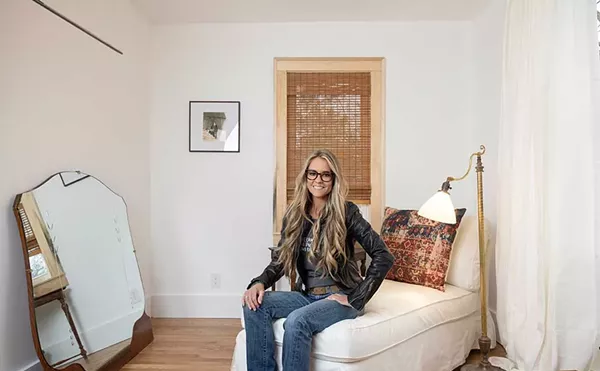
Audio By Carbonatix
[
{
"name": "GPT - Leaderboard - Inline - Content",
"component": "35519556",
"insertPoint": "5th",
"startingPoint": "3",
"requiredCountToDisplay": "3",
"maxInsertions": 100,
"adList": [
{
"adPreset": "LeaderboardInline"
}
]
}
]
Some things in life are so simple they can be staring you dead in the face and you still won’t see them, because you’re looking for something considerably more complex and equally less obvious. It’s small wonder that many of us miss our blessings; we don’t recognize them unless they come wearing the proper attire.
In Salvation, bell hooks makes the relatively simple point that love has the power to heal. Given that obvious statement, Salvation poses the obvious question: Why aren’t more people trying it out? More importantly from her standpoint as an African-American woman, why aren’t more black people seeing the need for love? Why have nearly all high-profile black leaders of this generation seemingly ignored the essential nature of love as an integral component of their proposed remedies to heal the black race from centuries of oppression? As hooks so accurately points out, even Dr. Martin Luther King Jr., considered by many to be the apostle of love, was more preoccupied with convincing blacks to love and forgive their enemies rather than to first love themselves.
Perhaps hooks says it best herself:
As a people we are losing heart. Our collective crisis is as much an emotional one as a material one. It cannot be healed simply by money. We know this because so many of the leaders who preach to us about the necessity of gaining material privilege, who are holders of wealth and status, are as lost, as disenabled emotionally, as those among us who lack material well-being. Leaders who are addicted to alcohol, shopping, violence, or gaining power and fame by any means necessary rarely offer to anyone a vision of emotional well-being that can heal and restore broken lives and broken communities. ... Since our leaders and scholars agree that one measure of the crisis black people are experiencing is lovelessness, it should be evident that we need a body of literature, both sociological and psychological work, addressing the issue of love among black people, its relevance to political struggle, its meaning in our private lives.
The reasons why love is important and necessary, and why it continues to be overlooked as a necessary component of a healthy life, form the essential basis of hooks’ deceptively simple book. I say “deceptively simple” because hooks has chosen to use a style that is much more accessible than that used by intellectual authors. Most of them seem to love writing for one another but don’t quite comprehend the need to write for those who need their knowledge the most. As a matter of fact, many of hooks’ own previous works fall into that very category of unnecessarily dense “academese” that should probably qualify as a foreign language.
Unfortunately, it’s this very simplicity that is already attracting criticism from her academic peers and others who would prefer that she continue to write the more “biting” and “high-minded” works for which this extremely prolific writer-scholar-intellectual has become known over the years. However, though the writing style is now stripped down, simple and open, the topic — and related subtopics — that hooks has chosen to tackle is littered with cultural land mines. One example: hooks openly exposes the need for the African-American community to acknowledge, accept and love its own gay population — rather than continuing to behave, in the face of mountains of evidence to the contrary, that homosexuality and AIDS is more of a white folks’ problem that needs to be shunned whenever and wherever it dares to raise its ugly head in our neighborhoods and families.
Another example: hooks criticizes some of the more popular radicals of the ’60s generation, such as Black Panthers co-founder Huey Newton, black nationalist Malcolm X and Stokely Carmichael (later known as Kwame Toure), among others, as having steered the black liberation movement away from its more religious, church-based roots — and therefore away from any possible inclusion of love as a remedy — toward a more patriarchal, angry, violent approach that proclaimed black men as the warriors and black women as support staff. Furthermore, a “real man” became one who was willing to fight and take up arms against the oppressor — and for those who created this philosophy, that meant no homosexuals need apply. Although hooks is quick to point out many of the positive things that came from black militancy, she refuses to close her eyes to the fact that it was also responsible for creating a level of intolerance that hadn’t really been seen before in the black community, or at least not at that measure of intensity.
There are other touchy subjects tackled by hooks, but she doesn’t take them on simply to foster intellectual sensationalism. Rather, hooks broaches subjects that must be discussed by anyone of integrity who is honest about wanting to assist African-Americans in their ongoing challenge to heal themselves from a legacy of pain and suffering that has left far too many wounds which have yet to close. Furthermore, she points out that the healing power of love is not the mushy, soft, media-generated misrepresentation that is so often mistaken for the awesome power of the real thing.
Accordingly, she writes, “Making the choice to love can heal our wounded spirits and our body politic. It is the deepest revolution, the turning away from the world as we know it, toward the world we must make if we are to be one with the planet — one healing heart giving and sustaining life. Love is our hope and our salvation.”
Click here to read MT columnist Keith A. Owens' exclusive interview with bell hooks about her book.
Keith A. Owens is a Detroit-based freelance writer and musician. E-mail him at letters@metrotimes.com.





